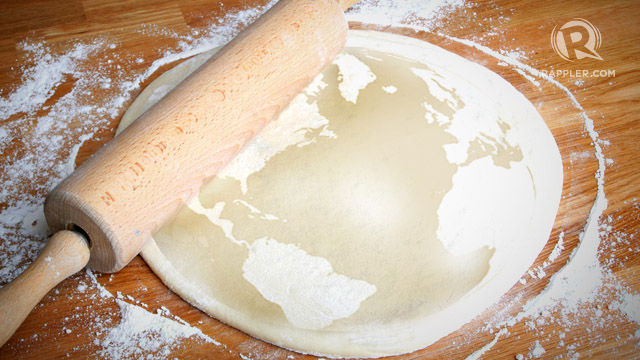SUMMARY
This is AI generated summarization, which may have errors. For context, always refer to the full article.
 “So, Mohammed, tell me how to make pizza.”
“So, Mohammed, tell me how to make pizza.”
Mohammed’s dark green eyes stared at me suspiciously at first. I asked him to sit across me in one of the smaller classrooms, leaving the door open for modesty. Outside, a bigger class was learning sentence construction, and Mohammed was my lone conversation student that evening.
I had just started teaching conversational English at an immigrant center in Brooklyn. Every Tuesday I found myself in a room full of Arab men (the women took their classes during the day). I wondered what they thought of me, a woman traveling over an hour from my Manhattan office to speak English to them, but my self-centered thoughts were soon replaced by my interest in my their stories. I met a 72-year-old man who escaped war torn Syria with only a passport in his chest pocket (he’s taken it with him ever since, so he showed me). Another man was a newlywed but ambitiously left his wife in Egypt to chase a dream in New York, but his poor English was keeping him from finding a job. Still another was Mohammed, a tall and hairy man in his thirties, quite intimidating if not for the strawberry filled cookies he brought to the class to share.
Mohammed had been in Brooklyn for about a year but only recently learned about the Center’s English classes, so he decided to check them out. When I asked him what he did for a living, he said, “I am a pizza man.”

So I asked him how to make a pie. He gladly gave me a lesson.
“First you mix flour, water and sugar together. You mix them good.”
“You mean, you mix them well,” I said.
“Oh, so not good? Okay, yes you mix them well. Then you add this uh, a powder I don’t know what is it called…”
I squinted.
“…to make it big.”
“Oh, to make it rise? Yeast?” I said.
“Yes, yeast, how do you spell?”
I scribbled the word in my notebook and turned it to face him. He copied it and wrote its Arabic counterpart beside it. He continued with his detailed account of the pizza making process while I spelled for him words like “dough” and “thin” and “sticky,” how the sauce is added and then the cheese, and how it is baked only until it is half-cooked and then the rest of the toppings are added.
“Why is it only half-cooked?” I asked.
“It’s like uh, it’s like the cheese and the dough take longer time to cook, and if I put the other toppings they will barn…”
“Burn…” I added gently.
“Yes burn, thank you, so you have to cook the crust good…”
“Well.” I smiled and Mohammed laughed. I didn’t want him to feel intimidated by overly correcting him.
I said, “It’s okay. I know what you mean when you say good but it’s better to say well.”
“Thank you, I would like to say in the correct way, please,” Mohammed said as he nodded his head in deference.
I wasn’t used to being an authority in English, being an immigrant myself. So I told him my story of arriving in this country years ago armed with what I thought was excellent English, only to open my mouth and not be understood. Mohammed said he often felt the same and it was quite discouraging. I told him to just keep talking.
“Eventually you’ll know who is really listening,” I said.
He liked my story and he told me his, of his wife Mai and daughters Farida and Habiba who are still in Egypt. Seven-year-old Farida is bright and is a born leader.
“Maybe because she is oldest so I watched her every step,” he said proudly.
Four-year-old Habiba is kind and is a few months too young to start school, so her mother is teaching her at home.
“But I see in her eyes she is curious. She is thinking.” Mohammed said as his eyes lit up in the way only a doting father’s could.
“I love Egypt. My friends and my family are there, but many things about it will not change from before, until today. So I would like a different life for my daughters, for them to be able to do what they want,” he said as if in the middle of a dreamy vision, before reeling it in slightly. “But of course, according to Islam because we are Muslim. If against Islam, I do not like.”
I asked how life is for him in the US, and he said he is busy. He works from eleven in the morning to eleven at night on his feet, arriving at 10:30 to change his clothes and be ready for work, making pies all day until it’s time to go home. It’s a very good business, he says. The cost of a pie is four dollars, and you can sell it for sixteen.
“When I do not work I have to do my own things like uh, how you say, clean the clothes?”
“Wash your clothes, or do your laundry?” I was pretty sure that’s what he meant.
“Yes, I do my laundry! This is good, I like this very much, to learn.”
Mohammed found his pizza job when he bumped into a fellow Arab at the bank who learned he didn’t have a job. Before he started, he knew nothing about pizza, and was tasked to help out in cleaning, mixing the sauce, and in chopping the toppings. Now he works alongside the owner and has perfected the art of the thin crust.
“I learn very good,” he said.
“Say that again for me?”
“I learn very well,” he said, smiling.
“You do learn very well. Tell me again what kind of job you had in Egypt before you left?”
“I practiced law,” Mohammed said.
“You were a lawyer?” I tried not to be so shocked. After all, this was every immigrant’s story – including mine.
“Yes, I specialized in Criminal Law.”
“Do you want to work in a law office here?”
“Yes, but my English is not very good.”
“So when you improve your English, will you try to get a job in an office so you don’t have to work so hard?”
“Well, I told you, whatever job I have, I like. I work in law, I like. I work in poultry farm in Egypt, I like.
My job now is pizza man, so I like.”
“So you like being a pizza man, Mohammed?”
“Yes, I like my job. I do a good job. I make pizza goo- Oh! I mean, I make pizza well.”
An easy laughter from two foreign lands then met in a cold classroom in New York. – Rappler.com
Shakira Andrea Sison is a Palanca Award-winning essayist. She currently works in finance and spends her non-working hours craving pizza in subway trains. She is a veterinarian by education and was managing a retail corporation in Manila before relocating to New York in 2002. Follow her on Twitter: @shakirasison and on Facebook.com/sisonshakira.
Pizza dough picture from Shutterstock.
Add a comment
How does this make you feel?
There are no comments yet. Add your comment to start the conversation.